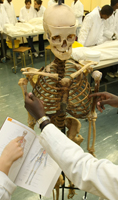Universal Healthcare: How & Why?
30 April 2014 | Story Yusuf Omar. |
 |
 |
 |
 |
Capitalist or communist, states should provide universal healthcare to their citizens, argues Minister of Health Dr Aaron Motsoaledi.
Global healthcare is on the verge of its third major transition in recent centuries, with publicly funded systems replacing the 'pay as you fall ill' model that dominates the South African landscape at the moment, says Minister of Health Dr Aaron Motsoaledi.
Following the advent of public health systems in the 18th century (think running water and sanitation) and the epidemiological transition of the 20th century, when immunisations were introduced, healthcare systems worldwide are starting to move away from the pay-first-and-treat-later model. Already, many European healthcare systems are funded by mandatory public payment - which would be the basis of South Africa's National Health Insurance (NHI) system, says Motsoaledi.
"When we released the green paper in 2011, people were still thinking that the NHI was just a South African adventure, and a very dangerous adventure, for that matter," says Motsoaledi. "But I need to warn that this phenomenon is now global. There is debate around the whole world about this issue; so much so that we have cause to believe that this year, that debate might enter the United Nations General Assembly."
Were this to happen, says Motsoaledi, it would be possible for publicly funded healthcare systems to be put on the agenda for adoption by all member states.
"So it's no longer an issue of [only] one country."
Healthcare financing
Motsoaledi underscores the importance of a healthcare financing system in achieving universal healthcare (the funding model he proposes draws on research by UCT's Professor Diane McIntyre). Part of the reason that healthcare financing systems have failed, says Motsoaledi, is because of "many declarations" that were made, but never - or poorly, at best - implemented.
The 1978 Alma-Ata Declaration, which committed nations to "the attainment by all peoples of the world by the year 2000 of a level of health that will permit them to lead a socially and economically productive life", was one such declaration - it promised much, but was barely acted upon: "Alma-Ata was really exciting, but I think that's fallen off the radar. It's no longer spoken about much.
"We were supposed to have healthcare for all by the year 2000. It came and went and nothing happened."
Instead, Millennium Development Goals (MDGs) were declared. But, with the deadline for MDGs fast approaching ("I don't want to call them a failure yet"), Motsoaledi notes a global shift in attitudes. Now, some argue that health and education should be provided for all citizens by the state, regardless of whether a state thinks of itself as capitalist or communist.
"Ultimately, if you want human beings to develop in health and education, there cannot be financial barriers."
Human beings should be allowed to develop according to their talents rather than by virtue of how much money they have, he argues.
Setting a precedent
Motsoaledi, who made headlines for bucking the apparent trend and using the public health system himself, says his own use of the system he helps provide for the nation is a matter of sound morals.
"I believe in the public health system. All we need to do is improve it."
While NHI-like schemes have been unsuccessfully attempted throughout postcolonial Africa, Motsoaledi, referencing WHO Africa's Regional Director Dr Luis Sambo, cites a number of conditions for such ventures to succeed.
Strengthening the capacity of the public healthcare infrastructure to provide "effective, safe and quality health services" is crucial. This includes adequate staffing, new buildings, up-to-date technology, utilities such as electricity and water supplies, waste management, communication, finance and maintenance.
In Africa, for the most part, this infrastructure largely didn't exist: "This was the [issue] that failed Kwame Nkrumah [in Ghana]; it's the one that failed Agostinho Neto [in Angola], and the one that [wrecked] Madiba's dream in the new South Africa."
To prevent the NHI following the same ill-fated path as its continental compatriots, Motsoaledi launched pilot districts in 2012.
Pilot districts serve as prototypes for the NHI and are helping the ministry identify what is needed to implement the programme countrywide. The ten districts, which include Tshwane, the Eden district in the Western Cape and the OR Tambo district in the Eastern Cape, were selected according to their socioeconomic standing, their health service performance, and demographics.
Private healthcare and income tax
Motsoaledi rejects claims that a publicly funded health system is inherently unfair because it takes money from income tax to benefit all. "We can't claim that because 'we pay taxes', we [can] claim the resources for ourselves and the poor are left behind." After all, Motsoaledi points out, everyone in South Africa pays a form of tax, be it income-based or VAT.
Nor does a publicly funded healthcare system sound the death knell for the private healthcare industry, Motsoaledi says, stipulating that there is no policy to suggest that he or his department want to do away with private healthcare.
Motsoaledi's talk, NHI: Turning the Tide in South Africa's Health Sector, was hosted by UCT's Department of Public Health and Family Medicine in late March. For readers interested in how NHI financing can work, read Professor Diane McIntyre's paper in The South African Medical Journal in 2012: 'What healthcare financing changes are needed to reach universal coverage in South Africa?'
 This work is licensed under a Creative Commons Attribution-NoDerivatives 4.0 International License.
This work is licensed under a Creative Commons Attribution-NoDerivatives 4.0 International License.
Please view the republishing articles page for more information.










